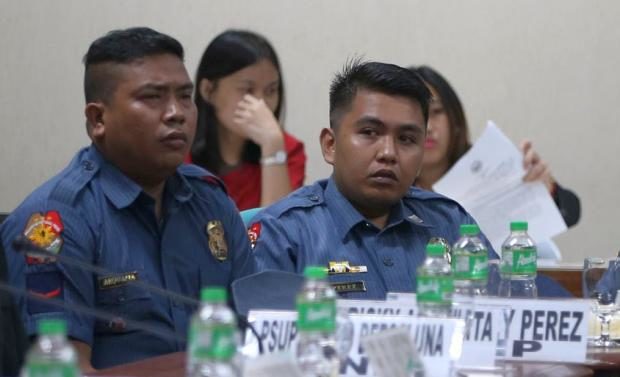Cops in Carl, Kulot slays fear death if moved to city jail

This photo, taken Oct. 2, 2017, shows PO1 Ricky Arquilita (left) and PO1 Jeffrey Perez at the Senate hearing on the killing of 19-year-old Carl Angelo Arnaiz and 14-year-old Reynaldo de Guzman. (Photo by EDWIN BACASMAS / Philippine Daily Inquirer)
While claiming they were not seeking special treatment, the two policemen accused of killing and framing teenagers Carl Angelo Arnaiz and Reynaldo “Kulot” de Guzman have asked the court to reconsider its earlier order designating the Valenzuela City jail as their place of detention.
In a motion filed on Thursday, Police Officers 1 Ricky Arquilita and Jefrey Perez appealed to Judge Georgina Hidalgo of Caloocan Regional Trial Court Branch 122 to let them remain in the custody of the National Capital Region Police Office at Camp Bagong Diwa, Taguig City, citing security concerns.
Arquilita and Perez—who have both been recommended for dismissal from the service—are accused of murdering, torturing and planting evidence against Arnaiz, 19 and De Guzman, 14.
Both residents of Cainta, Rizal, the teenagers left their houses on Aug. 17, 2017. The police alleged that they tried to rob a taxi driver in Caloocan the following day.
The two policemen, who at that time were under the Maypajo police precinct, claimed that Arnaiz shot at them first when they tried to arrest him, forcing them to fire back. Witnesses, however, said they saw the teenager begging for his life. There were also signs that he was tortured before he was killed.
Article continues after this advertisementThe body of De Guzman, on the other hand, was found floating in a river in Nueva Ecija on Sept. 5, bearing almost 30 stab wounds.
Article continues after this advertisementIn a hearing on March 19, the judge ordered the transfer of the two po licemen to the Valenzuela jail, saying they should be in a facility under the supervision of the Bureau of Jail Management and Penology, not at the Regional Public Holding and Accounting Unit (RPHAU) in Bagong Diwa.
According to Hidalgo, the RPHAU was not a detention facility for those awaiting trial.
But the policemen argued that some lawmen and even civilians facing cases, like customs broker Mark Taguba, former Sen. Ramon Revilla Jr. and Sen. Leila de Lima, were detained in police camps for security reasons.
They belied reports that they were being given special treatment at RPHAU, saying they “were locked in a PNP detention cell and wearing prisoner shirts.”
They also maintained that detaining them in the jail in Valenzula, instead of Caloocan, was “not an assurance” they would be safe, as many of the criminals they arrested had connections to drug syndicates who could have them killed while behind bars.